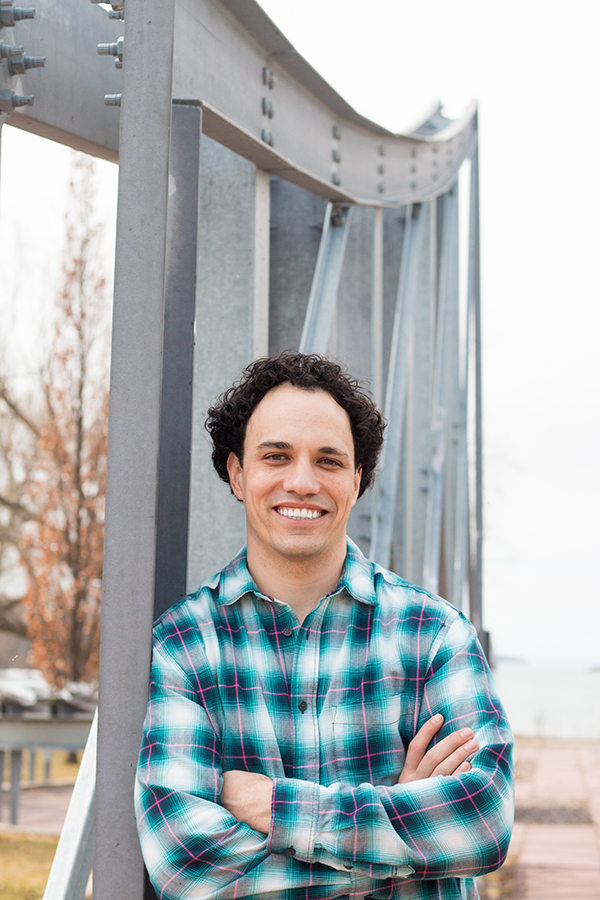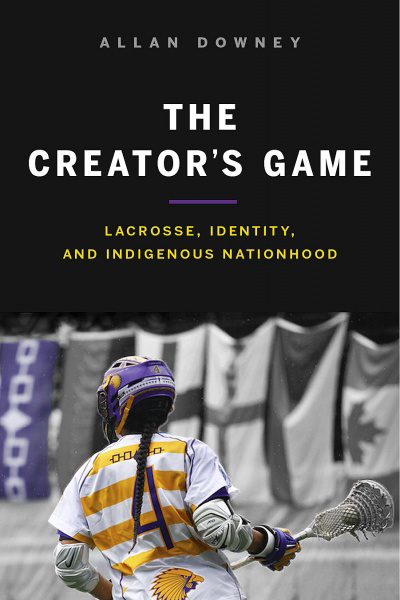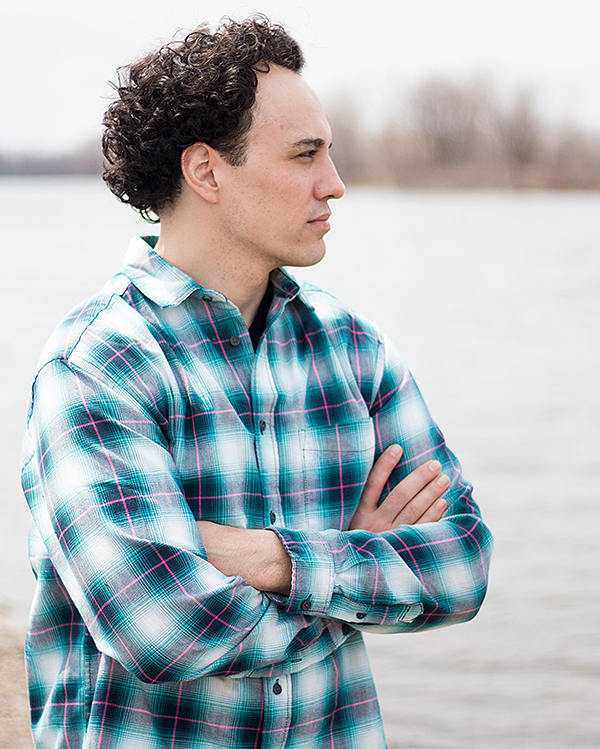While he's currently conducting research at Columbia University in New York City, Laurier graduate Allan Downey (MA '08, PhD '14) will start a new position as associate professor in the Department of History at McMaster University this winter. A historian specializing in Canadian and Indigenous history, Downey's academic interests include Indigenous identity, Indigenous and non-Indigenous relations, Indigenous political history and Indigenous sport history. His recent book, The Creator's Game, focuses on the history of lacrosse in Indigenous communities from the 1860s to the 1990s. Downey is Dakelh, a member of the Nak'azdli First Nation.
You grew up in Waterloo. How connected did you feel to your Indigenous heritage during that time?
I would say there are significant struggles being an urban Indigenous person and staying connected to your Indigenous heritage. But one of the great things about the Kitchener-Waterloo community is that it has a number of fantastic resources for Indigenous peoples. Still, for me it was a bit of a struggle. There was a kind of insecurity growing up 3,000 kilometres away from my home community, which is in British Columbia. I've always been a very proud Indigenous person and that was instilled in me since the day I was born, so not having the connection to my heritage as much as I wanted to – not be grounded in it as much as I wanted to – was a challenge. Eventually, Laurier played a big part in allowing me to reconnect and re-instill those connections.
Your mother had a native arts and crafts business when you were young and you travelled with her on the powwow circuit. How did that experience impact you?
That was a lot of fun. I spent my pre-teen and teen years travelling Ontario. Almost every weekend of the summer there is a powwow in a different community. The vendors travel together and help each other as they go from site to site setting up and selling arts and crafts. For me, it was the highlight of my summer, to see the Indigenous community celebrating its culture, heritage and history. To be in that space was empowering for me as an Indigenous person.

You are an accomplished lacrosse player, playing at Mercyhurst University in Pennsylvania, where you earned a bachelor's degree before attending Laurier. What do you enjoy most about the game?
It's a game that I fell in love with and became my passion, but ultimately it was never lost on me growing up that I was playing an Indigenous sport. To play an Indigenous sport and to know it was connected to our people, our history, our ceremonies and our culture was empowering. I could never have imagined where something as simple as a lacrosse stick would take me. I've had the opportunity to do graduate work because of my connection to lacrosse, I've had the opportunity to go down to the states and I was drafted professionally. A big part of what I do now is travel North America working with Indigenous youth, going to Indigenous communities and sharing my academic and personal experiences through the game of lacrosse. That's kind of been the best part of what lacrosse has given me in life: the ability to be able to reach out to communities through the game, through my work and to share what the game has provided me.

Your recent book, The Creator's Game, focuses on the history of lacrosse in Indigenous communities . Was there anything new or unexpected you learned about the game's history when working on the book?
I've been really lucky and fortunate to work with some of the most incredible people – elders and knowledge holders from Indigenous communities – and to work with those communities to share their culture, their history and their knowledge. There are so many amazing stories – the political resurgence of Squamish communities, the forming of the Iroquois Nationals lacrosse team. I love stories about Indigenous political resurgence and that's kind of what I have dedicated my career toward. Hearing those stories through lacrosse and being able to hear and write about those stories was the most enjoyable experience I had writing the book. And it was certainly the most surprising. I never anticipated a political connection and how significant the game was to Indigenous politics. That's not the case in every community, but it was amazing to learn about that connection.
Most people don't think of sports as having a spiritual aspect, but lacrosse does. Could you talk about that part of the game and why it is important?
Lacrosse in Indigenous communities is not separated from spirituality or epistemologies of Indigenous peoples surrounding their culture, language or ceremonies. It's embraced to play a role in all of that. There is this kind of reciprocity between Indigenous culture, Indigenous ceremonies and the game of lacrosse. This is not only emphasized, but it is central to what the game means to Indigenous communities. In a non-Indigenous, Western context, Canadians like to think that sport is separated from particular politics or religion or those kinds of influences. Certainly it is not. I think if we think of sport critically we'll see that. In Indigenous communities, there is a really important reciprocity happening between culture, ceremony, languages and the sport itself because it can help in the resurgence of all of these things.
How would you describe your Laurier experience?
Laurier gave me the opportunity to, if not reach my potential, realize that I did have the potential to go on to graduate school, to go on to writing a book and to be confident within a classroom. But ultimately I think the most important thing Laurier gave to me was recognizing the importance of community-based research – making sure you are putting communities at the forefront and they are getting something that is tangible and substantial. I was also attending Laurier at the time the Indigenous Student Centre was starting up. That community was significant and really important to me.
– Allan Downey
How important is finding a sense of community to an Indigenous person pursuing post-secondary education?
That connection to community is significant in that a lot of times it might determine a person's success at university. For me, I had been connecting with my home community in British Columbia and travelling back and forth since I was 10 years old, but to have a community through Indigenous Initiatives and the Indigenous Student Centre, to share the experience of what it's like to be an Indigenous person within the academy, I think that's really important. Now that I'm a faculty member I see that those experiences had a really big impact on how I approach the classroom.

Do you think there is anything that distinguishes Laurier when it comes to supports offered to Indigenous students?
What Laurier has been able to do is create levels of engagement and support services, at the student level, at the staff level and at the faculty level. That's a really complex thing to be able to achieve and a lot of universities aren't there yet. The community that Laurier has been able to create through Indigenous Initiatives helped me succeed. I wanted to quit multiple times throughout my graduate work, but the one thing that kept me going was support services through Indigenous Initiatives. I realized that other students were having similar struggles. I don't know if I would have been able to succeed had I attended school anywhere else.
There has been much discussion recently about incorporating Indigenous knowledge into post-secondary education for all Canadians. What do you see as the results that will come from this effort?
I think that universities can have a role for all of Canadian society, as well as Indigenous peoples, Indigenous youth and Indigenous communities in the resurgence of those communities. Let's be honest, for decades universities were training those who were leading residential schools. They certainly weren't training Indigenous peoples to improve and support their knowledge systems, to support their governance systems. This is an opportunity to shift that, an opportunity to change that. It's obviously needed. It presents an opportunity to right historic injustices, but also to recognize the validity of Indigenous knowledge and the validity and significance of what Indigenous communities can offer all of us as human beings.
What do you see as the most important issues facing Indigenous peoples in Canada?
With my work, I prefer not to focus on particular issues, but celebrate the contributions and the incredible movement happening in Indigenous communities – the resurgence of culture, ceremonies and history. Having those things supported is one of the urgent needs of Indigenous communities. I want to celebrate the incredible things happening in our communities that the media doesn't want to pay attention to. The majority of Canadians are not aware that Indigenous communities are helping themselves and they are doing phenomenal things when it comes to program building, language building and building educational tools, all grounded in their own nationhood, their own self-determination.
Some would argue the Truth and Reconciliation Commission (TRC) brought Indigenous issues to the forefront like never before in Canada. Do you hold out hope that the commission's report and recommendations will lead to a sustained effort at changing the relationship between Indigenous and non-Indigenous Canadians?
The Truth and Reconciliation Commission was unquestionably important in creating a critical consciousness among the Canadian public and putting these historical injustices at the forefront. That's really important and significant. But if we think there is a package solution in the TRC that's going to enable us to right these historical injustices in a short timeframe, I think we're kidding ourselves. The TRC offered us an opportunity to start. We can't forget that the Truth and Reconciliation Commission was initiated by an incredible group of people: the residential school survivors who were trying to give voice and exposure to what was cultural genocide. That needs to be at the forefront of any conversation when it comes to the TRC. Today, we are offered a tremendous opportunity to initiate the conversation.
– Allan Downey
You do a lot of work with youth in Indigenous communities. What kinds of work are you undertaking and why is this work important to you?
I've been travelling North America to Indigenous communities sharing Indigenous history, particularly when it comes to lacrosse. To be able to talk with Indigenous youth and tell them about the history of lacrosse based in their nationhood is really significant. Basing this history in their nationhood – be it Anishinaabe, Haudenosaunee or in my case Dakelh – and sharing those histories with them opens them up to see there are layers and levels to these things that we can talk about. What I'm really excited about moving forward is seeing what can become of these incredible youth. If only we give them a stage – give them a microphone, a pen to write, or the opportunity to go into the archives to do research – the stories they will tell are going to be groundbreaking. It was the youth who inspired me to see my book through to the end. I hope that one day an Indigenous youth picks that book up and says, 'I can do it better,' or 'I can tell a different story.'
You recently left a position as assistant professor at McGill University for new opportunities. What is on the horizon in your academic career?
There's some really exciting changes for me and my family. Currently, I am at Columbia University in New York City on a Fulbright fellowship doing research on my new project, which looks at the history of Indigenous iron workers in New York City and the connection between Indigenous ironworking and nationhood. The Fulbright fellowship is one of the most recognized fellowships in the world and to be at an institution like Columbia is really exciting. Following my time at Columbia, I will be joining the Department of History as an associate professor at McMaster University in Hamilton. It's an amazing opportunity to be back in southern Ontario. What I'm looking forward to the most is that universities in southern Ontario are creating these incredible Indigenous communities, Laurier included, and leading in Indigenous conversations and initiatives. Being closer to Laurier will also be significant, as Laurier has played a significant role in my life as an academic and my growth as an Indigenous person. I am forever indebted for that.